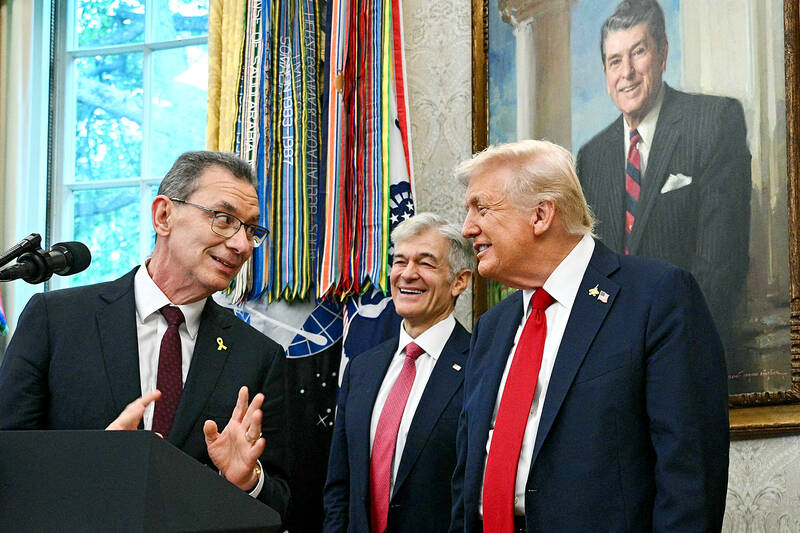Pfizer Inc on Tuesday secured a reprieve from US President Donald Trump’s long-threatened tariffs on the pharmaceutical industry by agreeing to slash some of its drug prices by up to 85 percent and selling directly to the US public, a move other major drugmakers are expected to follow.
Pfizer said it would ensure Americans receive comparable prices to those offered in other countries and would launch new medicines at parity, addressing a key Trump complaint that Americans unfairly shoulder the highest medical costs in the world.
In exchange, the company gained a three-year grace period from widely anticipated pharmaceutical tariffs that the Trump administration has been promulgating.

Photo: AFP
It is the latest example of the transactional nature of winning tariff exemptions from Trump, who has unilaterally wielded trade policy to exert power over multiple industries. As recently as last week, he threatened 100 percent tariffs on the pharmaceutical industry.
Similar deals could be forthcoming. Eli Lilly & Co said it is in discussions with the Trump administration to further expand patient access, as the announcement on Tuesday underscores the urgency of making medicines more affordable.
The latest deal appears to resolve two major threats facing Pfizer. It averts more damaging pricing policies on medicines, while shielding the company from tariffs tied to the administration’s Section 232 investigation into whether drug costs represent a national security threat.
The deal is a boon for Pfizer chief executive officer Albert Bourla, who has struggled to replace flagging sales of COVID-19 vaccines and therapies that were in high demand during the pandemic. It also yielded rare praise from US health officials, who previously criticized the CEO and his company.
“Albert and I have had a long history of antipathy and antagonism toward each other,” US Secretary of Health Robert F. Kennedy Jr said. “But I have to say his leadership in this took tremendous courage, and he really created a template for corporate responsibility, for putting public health ahead of his individual interests.”
Pfizer is to offer a large majority of its primary care treatments and some specialty brands at discounts of up to 85 percent — and at an average of 50 percent off — on a direct-to-consumer Web site called TrumpRx. The initiative is intended to allow Americans to pay for prescriptions at discounted rates that are negotiated by the government.
Pfizer also plans a US$70 billion push on research and development, and domestic manufacturing over the next few years, Bourla said.
The company did not specify which of its medicines would be made available on TrumpRx, but said the majority of its primary care drugs would be offered on the site.
Pfizer’s top-selling drugs include the blood-thinner Eliquis, the pneumonia vaccine Prevnar, and a shot and pill for COVID-19.
Most pharmaceutical companies declined to comment on the Pfizer news or did not return inquiries seeking comment.
Merck & Co said it is committed to working with the administration, and supports rising foreign prices and lowering US prices. Novo Nordisk A/S said it engaged in discussions with the administration, and is focused on improving patient access and affordability.

PERSISTENT RUMORS: Nvidia’s CEO said the firm is not in talks to sell AI chips to China, but he would welcome a change in US policy barring the activity Nvidia Corp CEO Jensen Huang (黃仁勳) said his company is not in discussions to sell its Blackwell artificial intelligence (AI) chips to Chinese firms, waving off speculation it is trying to engineer a return to the world’s largest semiconductor market. Huang, who arrived in Taiwan yesterday ahead of meetings with longtime partner Taiwan Semiconductor Manufacturing Co (TSMC, 台積電), took the opportunity to clarify recent comments about the US-China AI race. The Nvidia head caused a stir in an interview this week with the Financial Times, in which he was quoted as saying “China will win” the AI race. Huang yesterday said

Nissan Motor Co has agreed to sell its global headquarters in Yokohama for ¥97 billion (US$630 million) to a group sponsored by Taiwanese autoparts maker Minth Group (敏實集團), as the struggling automaker seeks to shore up its financial position. The acquisition is led by a special purchase company managed by KJR Management Ltd, a Japanese real-estate unit of private equity giant KKR & Co, people familiar with the matter said. KJR said it would act as asset manager together with Mizuho Real Estate Management Co. Nissan is undergoing a broad cost-cutting campaign by eliminating jobs and shuttering plants as it grapples

The Chinese government has issued guidance requiring new data center projects that have received any state funds to only use domestically made artificial intelligence (AI) chips, two sources familiar with the matter told Reuters. In recent weeks, Chinese regulatory authorities have ordered such data centers that are less than 30 percent complete to remove all installed foreign chips, or cancel plans to purchase them, while projects in a more advanced stage would be decided on a case-by-case basis, the sources said. The move could represent one of China’s most aggressive steps yet to eliminate foreign technology from its critical infrastructure amid a

MORE WEIGHT: The national weighting was raised in one index while holding steady in two others, while several companies rose or fell in prominence MSCI Inc, a global index provider, has raised Taiwan’s weighting in one of its major indices and left the country’s weighting unchanged in two other indices after a regular index review. In a statement released on Thursday, MSCI said it has upgraded Taiwan’s weighting in the MSCI All-Country World Index by 0.02 percentage points to 2.25 percent, while maintaining the weighting in the MSCI Emerging Markets Index, the most closely watched by foreign institutional investors, at 20.46 percent. Additionally, the index provider has left Taiwan’s weighting in the MSCI All-Country Asia ex-Japan Index unchanged at 23.15 percent. The latest index adjustments are to